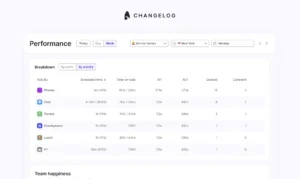
What is flexible working?

Flexible working is a way of working that suits an employee’s needs.
Flexible working represents an alternative to the traditional working week of going to the office from 9-5. It includes working remotely, hybrid working, compressed hours, part-time work, job sharing, flexibility around start and end times (also called flexitime), and generally, any shift pattern that suits the individual needs of an employee.
In the UK, All employees have the legal right to request flexible working. As of last week, every employee in the UK has the right to ask for flexible working from day one. Previously, you had to work for a company for 26 weeks until you had the right to ask for a flexible working arrangement. According to gov.uk, the legislation will empower people to have more of a say over when, where and how they work.
The new legislation is said to have “significant benefits for employees in terms of wellbeing and work-life balance” according to Peter Cheese, Chief Executive of the CIPD (Chartered Institute of Personnel and Development), who actively campaign for more legislation around flexible working.
Flexible working spokeswoman and campaigner Anna Whitehouse shared this post on Linkedin notifying her followers that “all workers are to be given the legal right to request flexible working from day one”. This represents a huge win for flexible working in the UK. It benefits individual employees, companies, and the economy as a whole.
Benefits of flexible working for employees
It promotes a healthier work-life balance
Flexible working and work-life balance go hand-in-hand. It allows you to achieve a healthier balance between the time you spend working and your free time. Having more flexibility over your schedule allows you to prioritise the things that make you happy (like taking the dog for a walk, or surfing 🏄♀️).
It supports other responsibilities
Flexible working allows people who have dependents, like children or elderly relatives, to fit their schedule around the people they care about. The immediate benefit of this is obvious, but it also has more positive knock-on effects. Take the example of a parent looking after their children. They incorporate the school run into their schedule, and tend to spend less money on childcare costs as a result. Also, they don’t have to take unpaid time off if they need to attend a doctor’s appointment or a parent-teacher meeting.
It reduces time spent commuting
The average commuting time in the UK has been found to be around 59 minutes per day. Remote working, among other types of flexible working arrangements, allows people to save money and time on commuting. Having that extra hour a day (along with a healthier wallet) makes flexible working beneficial for anyone with a considerable commute.
It increases happiness
This is a big one. The bottom line is that when people are given the autonomy to fit work around their life, and not the other way around, they are happier. This doesn’t just mean that they are happier in their role, but happier in general. What’s not to like about that?
It helps to bridge the gender pay gap
Something that may not be immediately obvious on the surface is the effect of flexible working on the gender pay gap. In traditional workforces with rigid schedules, mothers can face disadvantages. The role of a parent doesn’t follow the traditional 9-5 schedule and due to a lack of flexible working options, parents (disproportionately mothers) tend to take a step back from their careers, and find it harder to return.
Benefits of flexible working for employers
Increased productivity
Allowing people to have flexible working lives has been found to increase productivity. One YouGov report found that 30% of the 2,000 UK office workers polled felt that their productivity had increased when they worked remotely. Not only are individuals happier in their job, they are more productive too.
Reduced turnover
The cost of hiring a new employee is an eye-watering £30,000, according to HR review. Clearly, keeping people happy and productive in a flexible working environment makes financial sense. Reducing turnover not only saves time, effort and money, but allows companies to retain their best talent too.
More Coverage
Certain industries don’t fit into the “nine to five” mould. To function, they need to be available to customers all the time. One example close to our hearts is customer support. E-commerce companies, for example, have to provide support to their customers at all hours of the day and night, and in different locations.
Flexible working allows companies to employ individuals with different schedules, in order to ensure they serve customers whenever and wherever they need to. It’s a win-win, as people can fit work around their lifestyle, and the company itself can make sure it’s covering all of its customer support hours.
Why are we talking about flexible working?
At Surfboard, our mission is to make work more human. We make shift planning and scheduling software for support teams that empower workers (or Surfers, as we like to call them) to choose a shift pattern that suits their needs.
If you’d like to find out more, just fill out the form below and we’ll be in touch in a flash.



